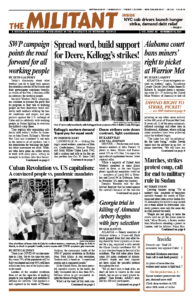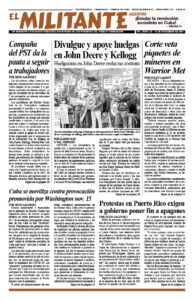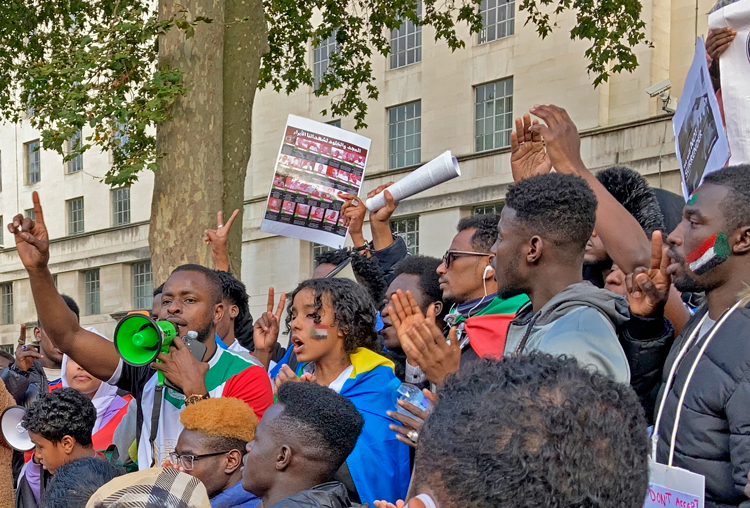Carrying banners saying “No to military rule,” hundreds of thousands marched through the streets of Khartoum and other cities across Sudan Oct. 30, demanding the military coup carried out a week earlier be overturned. Solidarity protests were held the same day in cities around the world.
“People are not going to leave the streets until we get the prime minister back,” Musa Hussein, a factory worker from Manchester attending a protest in London, told the Militant. Prime Minister Abdalla Hamdok was arrested, a state of emergency declared and the government dissolved by Lt. Gen. Abdel Fattah al-Burhan Oct. 25.
Hamdok and al-Burhan had been part of a joint civilian-military interim government that was supposed to pave the way for elections in 2023 and transition away from military control. This interim setup was established in 2019 after protests and strikes led to the overthrow of the bloody regime of Omar al-Bashir, who had held power for 30 years.
In the midst of a deep going economic crisis, the transitional government has defended the country’s wealthy rulers, including many in the military itself. It ended subsidies that made getting basic necessities possible for working people, at the request of the International Monetary Fund earlier this year, further ravaging workers’ living standards.
Toilers in Sudan have confronted a series of military-led regimes since winning independence from Britain in 1956.
“We have lived under these conditions for generations, myself, my mother, my grandmother,” said Randa Ahmad-Hassan at the London action. “That is why the youth are going to be out on the streets for as long as it takes.”
Protesters in Khartoum chanted slogans condemning both al-Burhan and Gen. Mohamed Hamdan Dagalo, commander of the Rapid Support Forces, formerly known as the Janjaweed militia. Hamdan was responsible for the slaughter of tens of thousands in Darfur under orders from the al-Bashir regime in 2003 and afterwards. These forces also helped carry out the massacre of anti-government demonstrators during the final days of al-Bashir’s rule.
Al-Bashir held power by brutality and by playing on national and religious differences fostered by the former British colonial rulers. His regime — backed by the Janjaweed — waged wars on minority peoples in Blue Nile and Southern Kordofan, as well as Darfur.
In recent years Washington has moved to gain a greater foothold in Sudan, with an eye on its natural resources and strategic location.
Oil workers join strikes against coup
The Oct. 30 protests were initiated by the Sudanese Professionals Association, a group of unions organized in 2012 among doctors, teachers and other professional layers. It has called strikes demanding the restoration of the transitional government. Oil workers at the state-owned Sudapet company joined the strike Oct. 27.
Cutting internet and phone access, authorities aimed to deal blows to the Oct. 30 protests. But neighborhood-based resistance committees, formed during the movement that ousted al-Bashir, ensured the action was widely publicized, using fliers and holding local rallies. Following the protest, troops from the army and Rapid Support Forces mounted patrols in the streets of Khartoum and Omdurman. At least 14 people have been killed in clashes with the military since the Oct. 25 coup.
Central army commanders are an integral part of the capitalist class, owning businesses in oil refining, rail and agriculture. The RSF controls much of the country’s gold mining. The brass use their hold on political office to ensure their companies get tax exemptions, and their profiteering remains hidden.
Placards and chants at protests in the past week have included calls for an end to military control over the economy. Demonstrators have also denounced links between the military brass and its allies among Arab governments. The Rapid Support Forces have provided the government of the United Arab Emirates with soldiers to fight in its military operations in Yemen and Libya.
The governments of the UAE and Egypt seek to advance their own interests in the country by offering to mediate between al-Burhan and Hamdok.
“We had no hope that the military might be able to work within a civilian state,” Muzan Alneel told the Financial Times Oct. 29. She is an engineer who took part in the 2019 protests. “We knew this was coming and we were just waiting for it.”
Military commanders fear loss of government control could lead to their businesses being taken from them and to the prosecution of officers for previous atrocities. In August six officers in the RSF were convicted and sentenced to death for the 2019 killing of six students protesting economic hardships.
In October 2020 the transitional government signed a peace accord with armed groups in Darfur, leading to the withdrawal of United Nations troops from the area.
Since then the Sudanese army, which pledged to maintain security in Darfur, has done little to stop assaults on refugee camps by militias that continue to operate. Thirty-six people were killed in an armed dispute over control of land in South Darfur in June. Some 1.5 million people are still displaced as a result of the conflict in the region.
Protesters say their actions will continue.
Catharina Tirsén in London contributed to this article.


